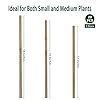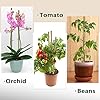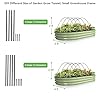Benefits of compost is to create a nutrient-rich soil amendment that provides a variety of essential nutrients to plants. Here are some of the key nutrients that come from compost:
- Nitrogen: Nitrogen is an important nutrient for plant growth and development, and it is found in high concentrations in compost. Nitrogen helps plants to develop healthy foliage and promotes overall plant growth.
- Phosphorus: Phosphorus is another essential nutrient that is found in compost. It plays a key role in plant development, helping to promote strong root growth and flower and fruit production.
- Potassium: Potassium is also found in compost and is important for plant growth and development. It helps to regulate water balance in plants, promotes disease resistance, and supports the development of strong stems and roots.
- Micronutrients: Compost also contains a variety of micronutrients, such as iron, manganese, zinc, and copper, which are essential for plant health and growth. These micronutrients help to support healthy growth, development, and disease resistance in plants.
Overall, compost is a valuable source of nutrients for plants, and it can help to improve soil health, increase plant growth and yield, and promote overall plant health and vitality.
Pruning Shears, 4 Pack Garden Shears with Gardening gloves, Clippers Handheld, Stainless Steel Garden Snips, Lengnoyp Pruners for Gardening
20% OffWidely Used: Pruning shears for gardening include 3 different blades and gloves for a variety of general pruning work. Great for trimming flowers, plants, bonsai, hydroponics, herbs, light branches and so on. Shears gardening tools are ideal for prun... read more
Misawce Outdoor Solar Metal Watering Can Small Hanging Decorative Waterproof Lights for Garden Decor, Yard Lights, Outside Patio Lawn, Gifts for Mom Grandma Women Birthday,1 pack, Warm White
43% Off【Small Garden Decorative Light】 Solar watering can lights (with shepherd hook) comes with 6 strands of LED flashing string lights (60 LEDs), the light cord is 17.7 inches long and can be easily bent and shaped into any shape you like, perfect for DIY... read more
Garden Kneeler and Seat with Wider Thicker Kneeling Pad, Heavy Duty Garden Stool Includes Gardening Tools Pouch and Bag, Convertible Garden Bench Kneeling Chair - Gifts for Parents Women Seniors
$49.99 (as of February 6, 2026 08:30 GMT +07:00 - More infoProduct prices and availability are accurate as of the date/time indicated and are subject to change. Any price and availability information displayed on [relevant Amazon Site(s), as applicable] at the time of purchase will apply to the purchase of this product.)1. WIDER AND THICKER KNEELING PAD – Enhanced comfort for extended gardening with a spacious 10.2-inch wide, 1.6-inch thick EVA foam surface. This garden kneeler provides optimal support for knees and back while planting or weeding, reducing strain du... read more
Plant Stakes,18 Inches Natural Garden Bamboo Sticks,BOVITRO 20Pcs Plant Support Stakes for Tomatoes,Beans,Vegetable and Potted Plants
28% Off[High Quality] - The Bamboo stakes are made of high quality natural bamboo.It’s very strong and durable,great for plant support!Each stakes is inspected manually to ensure quality. [Multipurpose Use] - Perfect for indoor and outdoor plants.It's great... read more
Garden Hoops Grow Tunnel, 6 Sets of 7FT Greenhouse Hoops for Raised Beds, Rust-Proof Fiberglass Frame for Garden Netting, Small Greenhouse Kit, Shade Cloth, Plant Row Covers, 30pcs
$19.99 (as of October 27, 2025 09:04 GMT +07:00 - More infoProduct prices and availability are accurate as of the date/time indicated and are subject to change. Any price and availability information displayed on [relevant Amazon Site(s), as applicable] at the time of purchase will apply to the purchase of this product.)Eco-Friendly Material: Our garden Hoops are made from high-quality fiberglass that will never rust and are anti-oxidation, good flexibility and can be used for a long time without affecting the soil, and plants. Mini Greenhouses Kit: hoop houses are ... read more



















![[High Quality] - The Bamboo stakes are made of high quality natural bamboo.It’s very strong and durable,great for plant support!Each stakes is inspected manually to ensure quality. [Multipurpose Use] - Perfect for indoor and outdoor plants.It's great...](https://m.media-amazon.com/images/I/51zEDOHJvML._SL160_.jpg)














